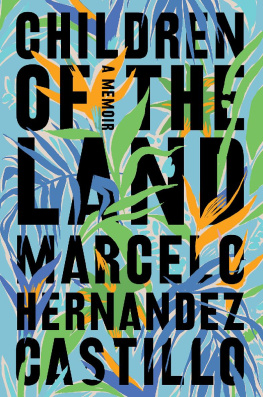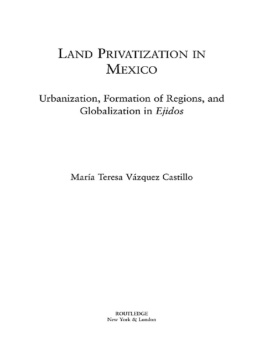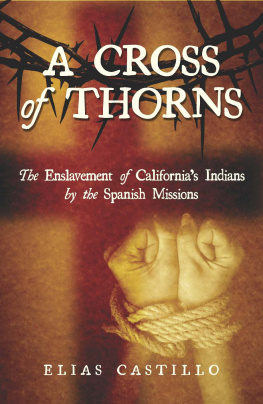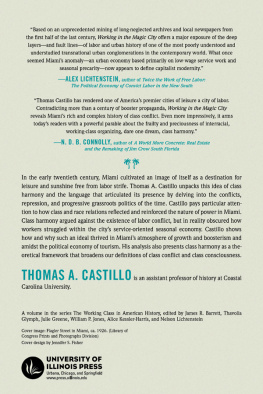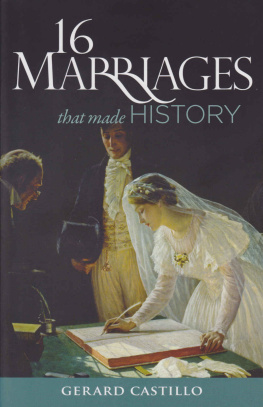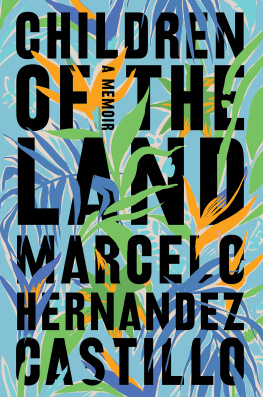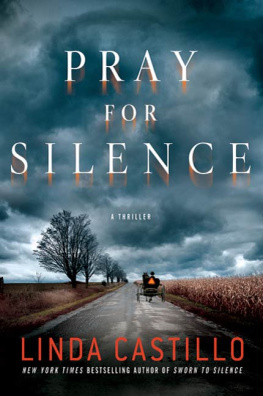

For my son Julian, listo mijo
Contents
T here were moments when I didnt need to tell my body how to move, moments completely new to me and yet something inside me knew exactly what to do when they came, as if I had been practicing for the Olympics. Some deep-seated knowledge rose from the very core of me. But it wasnt instinct. It was memory. I was tapping into an inheritance that up until that moment I didnt know I had. In this way life appeared monotonous, nothing was a surprise, but my body never really stopped shaking, a small breakwater holding back the tidal wave of the past. The first time I saw a gun it was the gun that did all the talking and part of me didnt know who to listen to, or if I was listening at all or running.
*
I t was a Sunday afternoon when I heard a knock on the door. The TV was on and the low sun had that familiar warmth particular to Sundays, blinding half of the screen through a crack in the curtains. My little brothers and I looked so still in our reflections. No one was really watching. Am was in her room resting her feet, preparing to tire them again the next day.
And again, the knock, louder.
I opened the door and a man held it open, the words ICE stitched onto his vest in bright gold letters.
Were looking for Marcelo Hernandez, he said, and before I could say anything he walked in past me, followed by three others. It happened so fast that I doubted it was actually happening. They all had their hands on their guns at the ready because you never know, right? The gun looked larger than I imagined one would look in my head. It was 2006, in the same Northern California home my family had rented for eight years and would go on to rent for another decade. I was only a senior in high school; maybe it was high time I should have seen a gun by then; I was overdue.
*
I knew ICE was all around us and that a raid was just on the horizon. But I couldnt tell anyone what I was always watching for, what I was always anticipating.
I could hear Ams words rattle in my head. Never tell anyone. She didnt need to remind me. I knew.
I saw them everywhere. I saw agents in trees, I saw their heads popping out of the ground like tulips, I felt their hands touching every coin in my pocket. But my mistake was that I always saw them outsidenever did I think I would one day find them inside my house. For some reason I thought our house existed beyond the limits of the border, as if it was a sovereign country of its own. It was the only place I didnt have to scrutinize myself, the only place the shaking stopped a little.
Green was still my favorite color. Their green fatigues had the afterthought of something livinggreen in spring, the green leaves of frangipani, iris, lily-of-the-valley overshadowed by so much color. I judged the ability of my body by its speed and weight. I judged how long it would take me to reach the back door and who would do the talking. They had the house surrounded.
*
I s Marcelo Hernandez home? he barked again.
Im Marcelo Hernandez, I said. He looked at the paper in his hands as if it was the first time he was seeing it, as if he needed to go outside and check the address to make sure they had the right place. That happened sometimes; they would get the wrong address but would pick up whoever was at the house they happened to storm anyways. It was better than coming back to the office empty-handed. It was a numbers thing.
Im looking for your father, he said, scanning the room. Who else is home?
My little brothers sat on the couch, staring at the swirls on the carpet. They were getting their first lesson in speaking only when spoken to, in answering only what was necessary. I did all the talking. In my head, I wondered if in ten or twenty years that would be my face printed on the warrant in their hands, if I was capable of taking more than just my fathers name and blood.
It had been about three years since Ap was deported in 2003. There was already nothing left of him in the house except for some old tools in the garage and the dip on his side of the bed, the outline of his absence weathered beneath the weight of his stillness over the years. Beyond that, all that remained was the likeness of my gestures to his, the way I carried my body, the way my mother said I chewed my food. Even his spare toothbrush had been thrown away long ago. It wasnt on purpose; there wasnt any thought to it. One day it was there and another it wasnt. We didnt bother trying to go through the stages of loss. We were young but could already turn off the parts of ourselves that hurt like a light switch. In ten years, I would hardly remember any of it.
The tulips sprouted. All of the leaves fell from the trees.
*
S urely Am heard the noises from her room, but I knew she was still there, I knew she would never leave.
My mother is in her room but she has a heart condition and Im afraid you might scare her. Can I please go back and tell her you are here and bring her out?
Okay, said the agent, and nodded to the others.
I went into the dark back room, waded through the thick smell of analgesic cream Am rubbed on her joints at night. Am asked who was in the living room. I told her not to worry. I said everything would be okay. I said it like that, okay , and grabbed her by the arm.
Someone wants to talk with you. It will be okay. Okay. Theyre looking for Ap. Everything will be okay.
I never said the word ICE, but she knew what I was talking about. I walked her out of the room and didnt let go of her arm as we entered the living room. I knew we both had that deep knowledge of flight inside of us although neither of us had ever spoken of it to each other. This wasnt the fight-or-flight instinct we all have, it was particular to immigrants because although everything inside us told us to run, we didnt. I knew her muscles were tensing just like mine even if she wasnt able to run in her older age like I was. And yet, holding her, I wasnt sure if I was keeping her from falling, or keeping her from running away. I could feel her body digging up memories of past raids. What if my body ran away involuntarily? What if it left Am behind out of instinct or some generational memory? I wasnt sure what I was or wasnt capable of doing.
*
T he paper in their hands had Aps picture on it. It was a recent picture. I wondered where they got it. It looked like the one they took when they deported him. One of the agents went into the rooms, looking in all the closets, and beneath the beds, ransacking the drawers. They shuffled through Ams things and checked the bathroom to see how many toothbrushes there were. They wanted to find traces of him, and perhaps, if they were lucky, even the warmth of the bed where he slept next to Am, not just the crevice. But they only found the life we had to make up without him, nothing more.
According to their records he had never left, or perhaps they thought he had returned. At first I thought it was a clerical mistake. Someone, somewhere in a small office lined with plants, may have hit a wrong button, and because of that, ten or so ICE agents surrounded our house and three held their guns pointed to the ground in front of us. I was certain they knew everything about me, my crushes, my fears, my deep longing to wander. I was sure they had been watching me for a very long time.
*
H ow long has he been gone? the agent asked my mother, and I answered because he asked in English, which she did not know. I did this often to avoid the brief and awkward silence that followed when such questions were thrown at her. I had always been a good translator; all of our doctor visits translating for my mother had trained me for this. I took out my phone and showed him my contacts and pointed to the bright little screen. It said Ap with a number from Mexico. I didnt have a calling card to dial out of the country and knew it would be expensive to call him without one but called anyways. I called as my only proof that he was indeed in Mexico and not with us, but he didnt answer. I thought back to the times I wished he didnt answer only to hear the familiar click of his phone coming on. I called again, hoping this time Ap would answer to tell them how far away he was, to describe everything around him as if he were on vacation, talking to his friends back home about how pretty it was. Again, no answer. How else could I tell them that there was nothing here for them; not me, not my brothers, not my mother, and certainly not my father? Sometimes I stuttered when talking to adults, but in such situations I was calm as if the panicked part of me had run.
Next page
